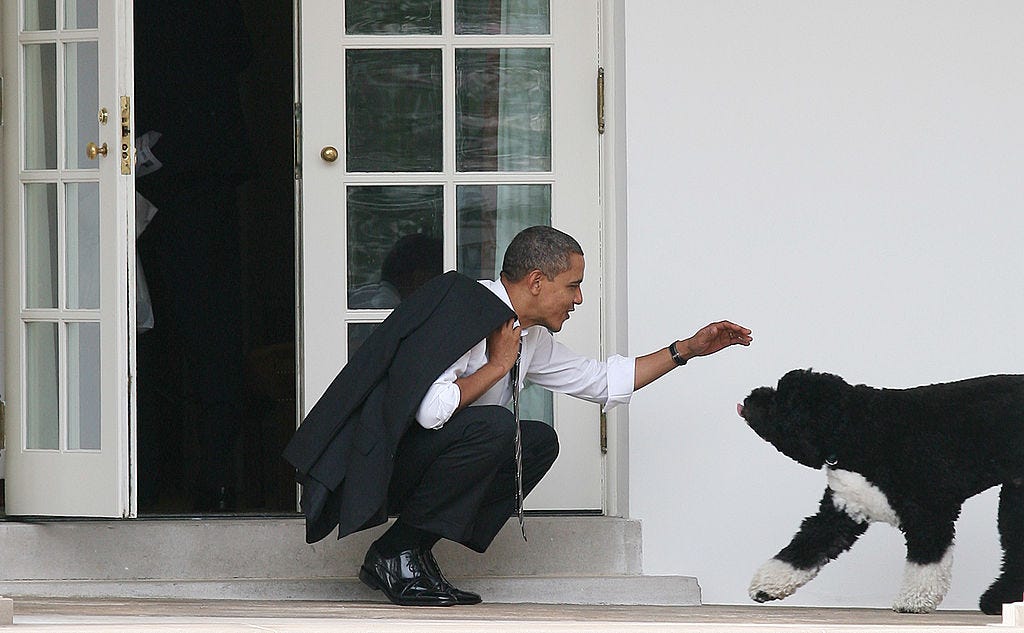Kindness is a Show of Strength
How we benefit from a president telling us how he feels about the loss of a family pet
You can become a paid subscriber for $50 a year or a mere $5 a month.

The death of the Biden family’s dog, Champ, has gotten me thinking about decency and kindness—and personal expressions of these feelings by a president. It’s also led me to reflect on the opposite—the need to revel in cruelty and hate—as if that is somehow an example of strength.
Here’s part of what President Biden and the First Lady released in a statement on Saturday:
"Our hearts are heavy today as we let you know that our beloved German Shepherd, Champ, passed away peacefully at home…In our most joyful moments and in our most grief-stricken days, he was there with us, sensitive to our every unspoken feeling and emotion. We love our sweet, good boy and will miss him always."
For any of us who have a dog or another beloved family pet, we can empathize with both the joy and the grief. The unconditional love of a family pet can be the glue that holds families together and softens life’s inevitable hardships.
But it’s the willingness to openly share these feelings that strikes such a chord after four years of a dog-less, pridefully cruel presence in the White House, one who expected praises for refusing to get a dog—he said it would be “phony”—and asked at a 2019 rally, “How would I look walking a dog on the White House lawn?”
(The first White House occupant not to have a dog in over 120 years, Trump also employed his negative, dehumanizing—and false—notion of dogs to attack and demean his enemies: “Fired like a dog.” ”Choked like a dog.” ”Sweat like a dog.”)
Last month President Biden’s old boss shared the loss of 12-year-old Bo, the Obama family’s Portuguese water dog, whom he called “a constant, gentle presence in our lives,” adding:
In this harsh period of our collective life riven by Republicans emulating the cruelty of Trump, praising the murderous Putin, and angling to toss aside democracy for an oppressive, voice-denying rule of autocracy, these expressions read like tender mercies—reminders that leaders who model compassion and kindness are critical defenses against unbridled decline and a shameless rejection of our better angels.
Recall the words of former President Obama in his 2019 eulogy at the funeral of Rep. Elijah Cummings that got to the heart of this choice:
"There's nothing weak about kindness and compassion. There's nothing weak about looking out for others. There's nothing weak about being honorable. You're not a sucker to have integrity and to treat others with respect.”
Yes, he was talking about the Maryland congressman, but he was also not-so-obliquely talking about the then White House occupant. It felt then like a gust of fresh wind, and it still feels like the kind of statements that need to be asserted to solidify in the public’s consciousness the distinction between right and wrong, between leadership comprised of kindness and decency and leadership defined by cruelty and bullying.
There may be some who view these distinctions as more performative than substantive, as if this is more about style than a deeper expression of the kind of nation America is and intends to be.
I think that’s wrong, especially when we have seen a rise in hate crimes and read reports of a rise in bullying among school-age children. As the potential for political violence continues to threaten the body politic, expressions of love and examples of kindness are necessary counterpoints to the degradations of spirit that help sustain and expand sociopathic rule.
Which brings me back to Joe Biden and the good fortune of having an antidote like him in the office of the presidency. On Friday, he released “A Proclamation on Father’s Day, 2021,” the kind of White House document that in previous times—what we used to call normal times—may have passed unworthy of mention.
But the opening lines underscore the character of the man and serve as example of what we should expect in our leaders and in our fellow humans:
“Like so many fathers, my dad was a man of decency, honor, generosity, and kindness. He had a profound impact on me, and instilled in me the understanding of the basic truth that everyone is entitled to be treated with dignity and respect. The value set my father taught me, I taught to my children and my grandchildren.”
Leadership has the ability to educate and inspire, to provide aspirational visions of what can enable us to be better people and also become a better nation. That will take policies, practices and, yes, personal expressions that can both advance our democracy and motivate each of us to act more often with decency and kindness.
Addendum: My family’s much-loved beagle, Hazel, wants you to know that she approves of the preceding message.
If you value this writing, I hope that you will consider becoming a paid subscriber.






Thanks, as always, Steven for distilling these clarifying points to lead to an understanding far greater than the topic sentence. Your writing is masterful.
How can Democrats think they can negotiate with a party who mocks someone over the loss of a beloved family dog?